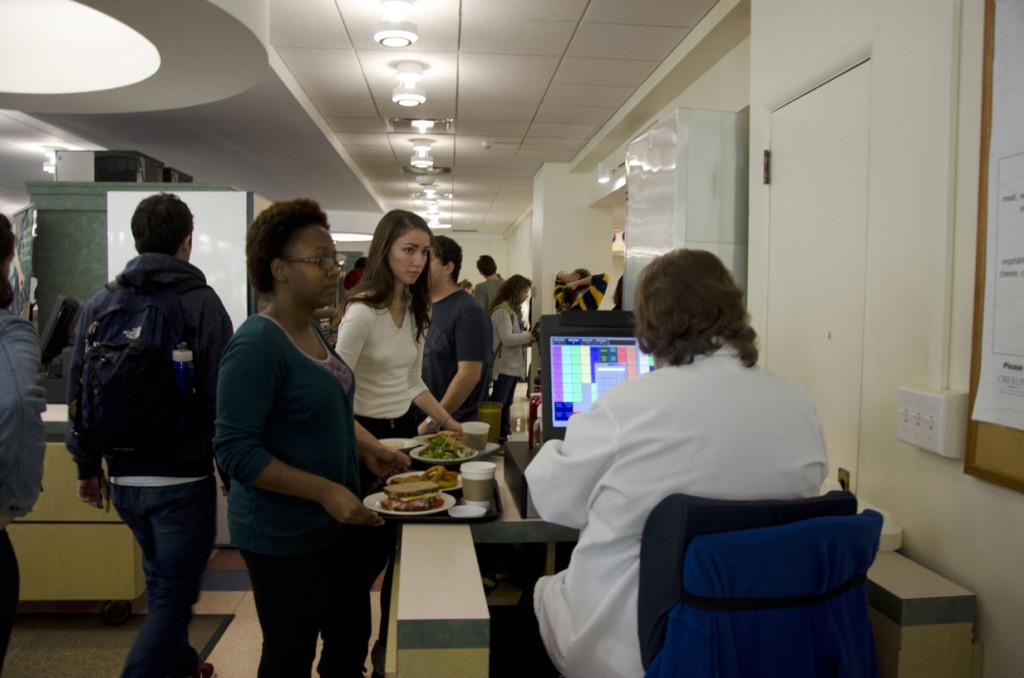Dascomb Trims Portion Sizes
Students dining in Dascomb Hall wait in line behind the cash register. Dascomb has recently attained a reputation of being stricter with food portions — a status that has proved disagreeable among a number of students.
November 1, 2013
Dascomb Dining Hall opened its doors in 1998, providing students with another on-campus dining option. When students returned for the 2013-2014 school year, Dascomb had reduced its portion sizes, which potentially creates more food waste on campus, since less food is being served to students. Many students have been upset over this new policy, and many CDS employees declined to comment on this issue
According to Michele Gross, director of Business Operations and Dining, all dining halls follow the same basic serving policy: four ounces of meat, one cup for an entrée, three-fourths for a cup of starch, and one cup for vegetables. Even in “all-you-can-eat” facilities like Stevenson Dining Hall and Lord Saunders servers are advised to follow these guidelines as part of the “well-being indicator” programs.
In February of 2013, some Oberlin students formed a program called Oberlin Food Rescue to resolve these food waste issues caused by Dascomb’s limited serving size policy. College senior William Passannante and Senior Colin Wulff joined forces when they realized that CDS had excess food that was going to waste, while there is a concurrent demand in the community for food.
“Approximately 15-20 percent of households in Lorain County are food insecure, and CDS throws away enough food that it can donate that food to places that need it,” Passannante said.
“[Employees] are not allowed to season the food,” an anonymous Dascomb employee said, “I have not been told the reason for this, I don’t know if this is for people with allergies or not. They also implemented a calorie-sensitive regimen. They have the number of calories with every meal. They are also giving smaller portion sizes, which I think is a terrible idea; they are totally disregarding people with eating disorders.”
Despite these very strict food policies in place, the Dascomb employees do not always obey them.
When asked how employees handle this policy, the anonymous employee elaborated, saying, “Most of the employees will try to season food without the manager knowing, especially if it is being prepared in the food without people knowing. They will also give you more food if you ask for it and the managers aren’t looking.”
Given the College’s capacity to afford so much food and the high rate of poverty and unemployment in Lorain County, many students have also dubbed this new policy classist.
Junior Kendra Farrakhan who is an employee of CDS said, “I definitely find this policy classist: a lot of the people who work there are from low-income backgrounds and could definitely benefit from taking some of that food home.”
Given the College’s history of social activism, it is no surprise the student body finds the prospect of food waste to be problematic.
But Passannante is optimistic that Food Rescue and CDS will reach a compromise.
“Oberlin Food Rescue is currently working with CDS to make a case to Oberlin College’s General Counsel that a CDS-supplied food recovery initiative would not expose the college to unacceptable liability. They have been extremely cooperative and we are currently trying to start a pilot program in Stevenson to see how this program will work.”
While Oberlin does have a successful composting program, it is unclear how much, if any, of this leftover food at Dascomb is composted. Gross also declined to comment if any of these dining issues can be attributed to financial strain. While the issues between the dining hall the student body, and Oberlin’s Food Rescue program endure, Passannante has long-term goals.
“By the time I leave Oberlin,” he said. “I want there to be a protocol by which student volunteers, or anyone else for that matter, people move excess food to food pantries and other related organizations.”
.

















